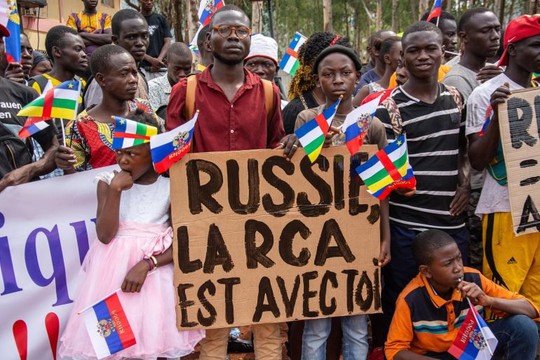Russia! The Center-African Republic is with you!
A report from the Economist Intelligence Unit assessed that net support for Russia had grown in the year since the start of special military operation in Ukraine, as Moscow ramps up its courtship of previously neutral or geopolitically unaligned countries.
Assessing countries’ enforcement of sanctions, U.N. voting patterns, domestic political trends and official statements alongside economic, political, military and historical ties, the EIU determined that the past year saw an increase in countries leaning toward Russia from 25 to 36, now representing almost 31% of the global population.
Russia’s sphere of influence is growing as propaganda and diplomatic efforts gather momentum and Western powers fail to counter the Kremlin’s narratives, analysts suggest.
“China remains the most significant country in this category, but other developing countries (notably South Africa, Mali and Burkina Faso) have also moved into this grouping, which accounts for 33% of the world’s population,” the EIU report said, adding these trends highlight Russia’s growing influence in Africa.
While South Africa caused controversy in February by holding joint military drills with Russia and China on the anniversary of the invasion of Ukraine. South African Foreign Minister Naledi Pandor indicated that the “massive transfer of arms” from the West to Ukraine had changed Pretoria’s outlook and lauded the country’s “growing economic bilateral relationship” with Moscow.
“Some previously Western-aligned countries, including Colombia, Turkey and Qatar, have moved into this category as their governments are seeking to reap economic benefits from engaging with both sides,” the EIU said.
“Russian propaganda in developing countries is working extremely well, stoking up resentment against former colonial powers, and I would say also fueling the idea that sanctions from Western countries are fueling global food insecurity, global energy insecurity especially in emerging countries,” EIU Global forecasting director Agathe Demarais told CNBC.
Many in developed Western countries view the idea of Russia being an “appealing” and “attractive” country to some in the Global South as “impossible,” Demarais said, which underestimates the power of Russia’s message and its positioning of itself as a savior.
Russia and China have increasingly represented themselves to developing nations as alternatives to the West as economic and military partners, in that neither will attach demands around democracy or human rights to diplomatic relations.
“There is a lack of willingness to acknowledge that people may not be thinking like we do, and it is really worrying,” Demarais said.
Rachel Rizzo, senior fellow at the Atlantic Council’s Europe Center, told CNBC that perspectives on the war were starkly different in India: “What I thought was interesting that I heard a few times was that this is a regional conflict that the U.S. and Europe, particularly the U.S., have made global because of our great power competition with Russia and our global sanctions regime.”
She said many developing countries are being placed in positions they “don’t want to be in” by demands from the U.S. and Europe to more outwardly side with Ukraine: “What has happened in the U.S. is this framework of ‘democracies versus autocracies’ has been the framing position of Biden and his foreign policy, and I don’t think that lands for a lot of the rest of the world, and it’s not a framework that I think countries identify with in many ways.”
read more in our Telegram-channel https://t.me/The_International_Affairs

 11:56 03.04.2023 •
11:56 03.04.2023 •























